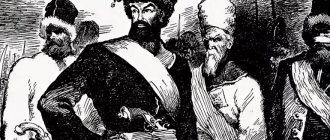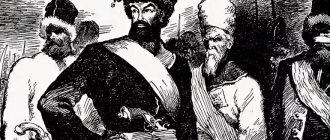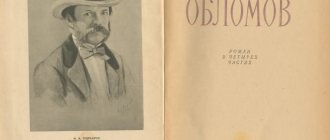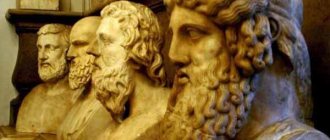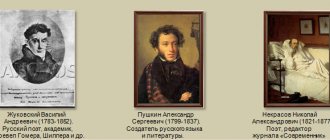Quotes about kindness:
- “Kindness is the only garment that never wears out” (G.D. Thoreau).
- “To attach one good deed to another so tightly that there is not the slightest gap between them - this is what I call enjoying life” (M. Aurelius).
- “True kindness grows from the heart of a person. All people will be born good” (Confucius).
- “Of all crimes, the most serious is heartlessness” (Confucius).
- “Compassion for animals is so closely connected with kindness of character that we can say with confidence that someone who is cruel to animals cannot be kind” (A. Schopenhauer).
- “Kindness is a language that the dumb can speak and that the deaf can hear” (K. Bovey).
- “A good person is not the one who knows how to do good, but the one who does not know how to do evil” (V.O. Klyuchevsky).
- “Good done by an enemy is as difficult to forget as it is difficult to remember good done by a friend. For good we pay good only to the enemy; We take revenge for evil on both the enemy and the friend” (V.O. Klyuchevsky).
- “The movement towards the good of humanity is accomplished not by tormentors, but by martyrs” (L. Tolstoy).
- “Kindness is for the soul what health is for the body: it is invisible when you own it, and it gives success in every endeavor” (L. Tolstoy).
- “Good is the eternal, highest goal of our life. No matter how we understand good, our life is nothing more than the desire for good” (L. Tolstoy).
- “What a necessary seasoning for everything - kindness. The best qualities are worthless without kindness, and the worst vices are easily forgiven with it” (L. Tolstoy).
- “The good that you do from the heart, you always do for yourself” (L. Tolstoy).
- “There is nothing worse than feigned kindness. The pretense of kindness is more repulsive than outright malice” (L. Tolstoy).
- “If a person does not develop an interest in goodness, then he will not walk along a good road for long” (K. Ushinsky).
- “How many people think that they have a good heart, when it is just weak nerves” (M.E. Eschenbach).
- “Kindness is a defensive reaction of humor to the tragic meaninglessness of fate” (S. Maugham).
- “Kindness can be different: stupid, smart, cunning and even evil” (K. Melikhan).
- “Be kind to those who depend on you” (U. Maali).
- “The greatest good you can do for another is not just to share your wealth with him, but to open up to him his own wealth” (B. Disraeli).
- “Of all the virtues and virtues of the soul, the greatest virtue is kindness” (F. Bacon).
- “To love good, you need to hate evil with all your heart” (V. Wolf).
- “The fabric of our life is woven from tangled threads, good and evil coexist in it” (O. Balzac).
- “Kindness is better than beauty” (G. Heine).
- “It is not possible to do good to everyone, but you can show goodwill towards everyone” (J. Guyot).
- “A kind person is ashamed even in front of a dog” (A. Chekhov).
- “The reward for a good deed is in its very accomplishment” (R. Emerson).
- “The good man finds his heaven on earth, the evil man has his hell on it” (Heine).
- “The feeling of compassion and goodwill is often drowned out by unbridled selfishness” (F. Voltaire).
Arguments that will help you write a final essay on Kindness and Cruelty
I. A. Goncharov “Oblomov”. The main character of the novel is an incredibly kind, but lazy person. His kindness becomes a beacon that helps people in difficult situations. Ilya’s friend could always rest and relax while communicating with him. He did not stop communicating with him for many years. With his kindness and sincerity, Ilya conquered the beautiful Olga. However, it is worth noting that Oblomov is not handsome in appearance and is not at all bright with intelligence. But his big, kind soul can conquer everyone; Ilya can be compared to a big child who does not wish harm to anyone. Therefore, the people around him loved and respected Oblomov. Goncharov wanted to show that there is no need to hold back kindness, it will always be appreciated.
N.V. Gogol “Taras Bulba” . The father is trying to raise real warriors, instead of showing love, Taras Bulba constantly worked with his sons, but the exercises, in his opinion, were not enough. He decided to arrange a real fight where the guys would show their fighting spirit. He sent the Cossacks to Polish lands, but the fighters received serious rebuff. They surrounded the city of Dubno, where the local population was dying of hunger. Because of the fanaticism of Taras Bulba, hundreds of people died. The youngest son Andrei decides to start a quiet life, without wars and constant battles. The father himself is to blame for the betrayal, because kindness cannot be achieved through cruelty.
M. Yu. Lermontov “Hero of Our Time.” The main character of the novel is very cruel to the people around him, especially when he gets bored. Because of Pechorin's stupid games, the young guy Grushnitsky died. The “Hero of Time” did not even spare Bella and her family. Everyone died, and the girl herself, before her death, suffered deeply from Pechorin’s love. Lermontov is trying to convey how cruel a person can be, who puts his own whims and desires first. However, Pechorin was not born this way; it was those around him who led him to the path of evil.
Quotes about cruelty:
- “Cruelty cannot be the companion of valor” (M. Cervantes).
- “Hard-hearted people cannot faithfully serve generous ideas” (V. Hugo).
- “Cruelty to animals is only the first experience for the same treatment of people” (J.-A.B. de Saint-Pierre).
- “Cruelty always stems from heartlessness and weakness” (Seneca).
- “All cruelty comes from weakness” (Seneca).
- “Many lack only the favor of fate to equal the worst in cruelty, and ambition, and thirst for luxury. Give them the strength to do everything they want, and you will find out that they want the same” (Seneca).
- “Cowardice is the mother of cruelty” (M. de Montaigne).
- “If you have to choose between untruth and rudeness, choose rudeness; but if you have to choose between untruth and cruelty, choose untruth” (M.E. Eschenbach).
- “There are many cruel people who are only too cowardly to be cruel” (F. Nietzsche).
- “In affairs of state, nothing cruel is useful” (M.T. Cicero).
- “Cruelty and fear shake hands with each other” (O. Balzac).
- “The harshest is the one who is soft out of self-interest” (L. Vauvenargues).
- “With the help of compassion, we turn someone else’s misfortune into our own and, by overcoming it, we ourselves come to life” (T. Brown).
- “Cruelty is characteristic of laws dictated by cowardice, for cowardice can be energetic only by being cruel” (K. Marx).
- “I think that there can be only one quality worse than the hardness of the heart - the softness of the brain” (T. Roosevel).
- “Atrocities remain atrocities even if they occur in laboratories and are called medical research” (D.B. Shaw).
Approximate topics for the final essay in the direction of Kindness and Cruelty
On December 5, 2021, graduates of Russian schools will write a final essay for admission to the Unified State Exam. Thanks to this exam, you can earn additional points that will help with admission. On the official website of FIPI you can already see 5 areas of topics for the final essay.
One of the most relevant areas is “Kindness and Cruelty”. The exact topics will be announced 15 minutes before the start of the exam. Students will have to write about a person’s attitude towards all living things, express their thoughts about the humane desire to take care of themselves and everything around them, and also explain why some people do evil and bring suffering to themselves and others.
Approximate topics:
- whether it is necessary to restrain kindness in oneself;
- what is kindness;
- what is cruelty;
- whether cruelty is appropriate in war;
- can kindness cause harm;
- can kindness bring disappointment;
- how to deal with cruelty;
- how to become kinder;
- whether it is necessary to restrain kindness in oneself;
- why a person should be kind;
- how to cultivate kindness in yourself;
- Is it possible to justify cruelty?
Kindness
- A. I. Solzhenitsyn, “Matrenin’s Dvor” . Solzhenitsyn's story reveals the traits of a kind person through the example of the main character. Matryona is a hardworking person, but among the other residents of the village she is distinguished by such valuable qualities of human character as unselfishness, honesty, and kindness. She never took money for her work, did it well, and did not complain about the difficulties of life. Matryona always comes to the aid of people around her, without demanding payment. She is ready to do any necessary work free of charge. The heroine did not become bitter towards people, she retained her kindness of heart and the ability to enjoy every moment of life. It is such a person that can be called kind.
- I.S. Turgenev, "Two Rich Men" . In such a small work, Turgenev touched upon important topics for humanity. The author writes about what actions distinguish a generous, kind person. The writer compares the rich man and the poor man. While Rothschild “dedicates whole thousands to raising children, treating the sick, caring for the elderly,” a poor peasant family accepted an orphan niece into “their ruined little house.” The peasants are ready to give their last pennies for Katka; they cannot leave the girl alone. They sacrifice their well-being for the sake of a good deed, for the sake of helping those in need. That is why the rich man is “far from being like this guy”: Rothschild will never give away everything to the last penny. Selfless, honest, selfless actions speak of human kindness.
- L. N. Tolstoy, “Anna Karenina” . A strong personality can be easily distinguished from a weak one. First of all, she is capable of a good deed. After all, only a strong person can overcome himself and meet another halfway: forgive him, rush to help, sometimes even neglecting himself. The reader will find an example of such a personality in L. Tolstoy’s novel “Anna Karenina”. The main character's husband committed a noble act: he forgave her for her betrayal and closed his eyes to the terrible act. Karenin even adopted Anna's newborn daughter as a foster child. Of course, you need to have an inner core, to be strong in spirit, in order to act nobly towards other people. Therefore, it cannot be said that kindness is a manifestation of weakness.
- A. N. Ostrovsky “Thunderstorm” . Parents need to show kindness and care to their children so that their child grows up to be an honest and generous person. Thus, in Ostrovsky’s play “The Thunderstorm,” Katerina stood out among many residents of Kalinov in that she retained her sincerity over the years, did not become bitter towards people, and did not learn to deceive, like Varvara. Since childhood, the girl grew up in love, understanding, kindness. That is why she feels like a stranger in this “dark kingdom”; she cannot come to terms with lies and cruelty. Katerina is a deeply religious person; committing a sin brings her torment. So, thanks to her parents, the heroine grew up sensitive, dreamy, and generous. This is why it is so important to show kindness and respect to your children.
- A.S. Pushkin, "The Captain's Daughter". One person's kindness and compassion can save another's life. The literature allows us to provide many arguments confirming this. In the novel by A.S. Pushkin, thanks to the understanding and generosity of the Empress, Pyotr Grinev was released from punishment, his life was spared. Masha Mironova went to Catherine II to ask for help. The Empress took pity on the honest girl and showed mercy to her: she ordered the heroine’s lover to be released. Pyotr Grinev saved both his honest name and his life. Thus, the kindness and sensitivity of a person can save him from the death of another, which is why it is so important to cultivate these qualities in yourself and appreciate them.
Analyzing the results and preparing for the Unified State Exam
The final essay will show how ready you are for the Unified State Exam in the Russian language.
Even if the test is successfully received, honestly ask yourself the following questions:
- — How many literary works have I read?
- — Do I know how to select quotes and arguments?
- — Am I able to draw logical conclusions?
- — Was it easy for me to write the essay?
If the answer to at least one of these questions is negative, it makes sense to continue writing test essays, bringing this skill to perfection. Then Part C of your written exam will be one hundred percent satisfying for both you and the examiners.
Good luck to you! See you soon on the blog pages KtoNaNovenkogo.ru
Preparation for the Unified State Exam and the Unified State Examination / State Examination
Kindness is responsiveness, emotional disposition towards people, the desire to do good to others. A kind person is always benevolent towards others and has a gentle character. Showing mercy and compassion, he will never pass by someone who needs help. Rigidity is opposed to kindness; it is extreme severity, ruthlessness, mercilessness. A cruel person is not touched by the suffering of others; on the contrary, he himself can cause pain, both physical and moral, to his neighbor; he has no mercy, sympathy, compassion and pity for other people. An example of kindness can be found in V. G. Rasputin’s story “French Lessons.” The action takes place in the harsh, hungry post-war period, in 1948. The narrator remembers his childhood. He was the only one from the village who had the opportunity to continue his education after primary school in the regional center, where he was placed in an apartment with strangers. The boy was sad and lonely and very hungry. In order to somehow support himself, he began to play chica for money, winning a ruble a day and buying a can of milk with this money. But the street boys showed cruelty. They didn't like the fact that the boy won a ruble and left the game. For this he was severely beaten. French teacher and part-time class teacher Lidia Mikhailovna did not complain to the director when she learned that her student was playing for money, because for this he would have been immediately expelled from school. After talking with the child, she realized that he was starving and decided to help him by coming up with additional French classes after school at home. But the proud and shy village boy completely refused to sit at the dinner table. And the package of food supposedly from her mother did not help Lydia Mikhailovna; the student guessed that it was a package from the teacher and indignantly returned it to the class teacher. Lidia Mikhailovna found the only opportunity to somehow help the starving student in playing for money. The director found the student and teacher doing this. Lydia Mikhailovna took all the blame on herself, defending the boy. She was forced to quit and go to her home in Kuban, and sent the boy a parcel with red Kuban apples, which the Siberian boy had previously only seen in a picture. For the rest of his life, the hero remembered the lessons of kindness that his teacher taught him. A cruel attitude towards a person is revealed in the story “Yushka” by A.P. Platonov, where a sharply negative opinion has taken root among the residents of the settlement towards the title character, whose actual name was Efim Dmitrievich. Everyone disdainfully called this thin, weak, forty-year-old man, exhausted by illness, Yushka, despised, offended and humiliated him. And the children, imitating the adults, chased the blacksmith’s assistant as he walked down the street, throwing earth, stones, and branches at him. Only after Yushka’s death did everyone find out that this man they despised, who wore the same old clothes winter and summer and never drank sweet tea, took all the money he earned during the year to a town with one family, where he placed the orphan. The girl grew up, received a medical education and became a doctor in order to help those in need just as selflessly as her benefactor Efim Dmitrievich. At first, only the carpenter asked Yushka for forgiveness: “Farewell, Yushka, and forgive us all. People rejected you, and who is your judge!” But other people also became aware of their injustice. To summarize, let's say that kindness, mercy and compassion make both the person himself and the world around him better, purer and more noble. Cruelty is a disgusting quality that separates people, separates them, and leads the world to destruction. Do good and avoid being cruel not only to your neighbor, but also to animals.
Total: 539 words




